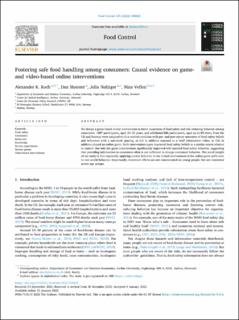| dc.contributor.author | Veflen, Nina | |
| dc.contributor.author | Koch, Alexander | |
| dc.contributor.author | Nafziger, Julia | |
| dc.contributor.author | Mønster, Dan | |
| dc.date.accessioned | 2022-06-20T12:07:37Z | |
| dc.date.available | 2022-06-20T12:07:37Z | |
| dc.date.created | 2022-03-31T15:58:40Z | |
| dc.date.issued | 2022 | |
| dc.identifier.citation | Data in Brief. 2022, Volume 135, 108825 | en_US |
| dc.identifier.issn | 2352-3409 | |
| dc.identifier.uri | https://hdl.handle.net/11250/2999611 | |
| dc.description.abstract | Data were collected in a randomized controlled trial of a game-based online intervention aimed at fostering awareness of food safety and risk-reducing behavior among consumers. 1,973 participants from the UK and Norway, aged 18–89 years, were assigned to (i) a control condition, or (ii) exposed to a brief information video, or (iii) in addition played an online game (two different conditions). In all conditions, participants answered a pre- and post-survey with seven days in between. The surveys comprised questions on sociodemographic background, preferences related to food, recent food safety behaviors and beliefs in the efficacy of a number of food safety actions, as well as beliefs in myths related to food and hygiene. Efficacy beliefs (13 questions in the pre- and post-surveys) capture how an individual thinks particular actions will affect the likelihood of contracting food-borne disease. Beliefs in myths (8 questions in the pre- and post-surveys) refer to commonly held ‘true-or-false’ beliefs with no base in scientific facts. Target behavior (21 questions in the pre- and post-surveys) refer to self-reported food safety behaviors that were targeted in the interventions. Additional questions address beliefs and behavior in relevant food safety areas that were not targeted in the interventions. The survey items related to beliefs and behaviors were based on or inspired by previous work of the SafeConsume EU consortium (www.safeconsume.eu). In the information condition, participants watched a two-minute information video about food safety. Participants were given information about five broad themes: personal hygiene (hand washing), kitchen hygiene (cleaning utensils and surfaces), washing fresh vegetables and fruits, not rinsing meat or poultry, checking the temperature of cooked meat or poultry. In the game conditions, participants first watched an information video (either the neutrally framed one from the information condition or a version with pictures framed to trigger a disgust reaction). Then participants prepared four recipes in an online game, where they were repeatedly confronted with food safety related actions. After each recipe, participants received feedback on how they handled a number of important food safety actions. Our survey measures provide scholars and practitioners with data from adults in Norway and the UK to perform analyses regarding consumers’ knowledge and behavior related to food safety. Data and the replication code for the associated research article Koch et al. [3] are accessible at Koch et al. [4]. | en_US |
| dc.language.iso | eng | en_US |
| dc.publisher | ScienceDirect | en_US |
| dc.rights | Navngivelse 4.0 Internasjonal | * |
| dc.rights.uri | http://creativecommons.org/licenses/by/4.0/deed.no | * |
| dc.subject | Food safety | en_US |
| dc.subject | Consumers | en_US |
| dc.subject | Behaviour | en_US |
| dc.subject | Knowledge | en_US |
| dc.subject | Survey experiments | en_US |
| dc.subject | Serious games | en_US |
| dc.subject | Video-based interventions | en_US |
| dc.subject | Pre and post intervention studies | en_US |
| dc.title | Food safety related efficacy beliefs, behaviors, beliefs in myths, and the effects of educational online interventions: Data from an online survey experiment with 1,973 consumers from Norway and the UK. | en_US |
| dc.type | Peer reviewed | en_US |
| dc.type | Journal article | en_US |
| dc.description.version | publishedVersion | en_US |
| dc.rights.holder | The Authors | en_US |
| dc.source.journal | Data in Brief | en_US |
| dc.identifier.doi | https://doi.org/10.1016/j.dib.2022.108102 | |
| dc.identifier.cristin | 2014314 | |
| cristin.ispublished | true | |
| cristin.fulltext | postprint | |
| cristin.qualitycode | 1 | |

